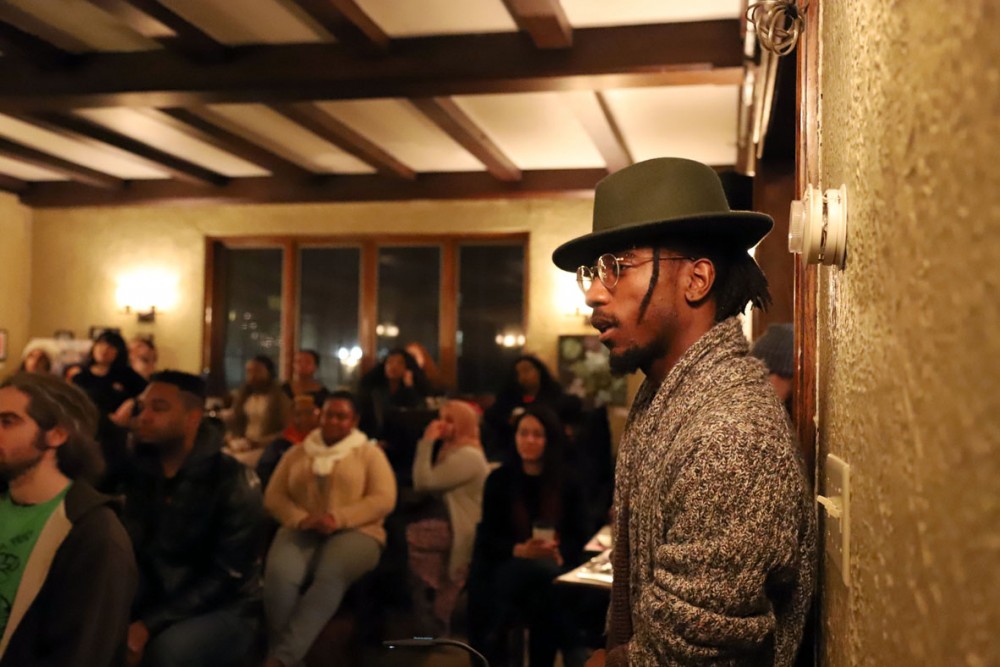A microphone can have a certain effect on a poem. Add in a stage, lights and an obscured-by-these-lights audience, and suddenly reading poetry might feel intimidating, even a bit impersonal.
Keno Evol, the founder of Black Table Arts, created “Chai & Chill: A different kind of poetry reading,” with the idea to focus on the dialogue shared in the room.
Without the distraction of a mic, the reader’s intention is prominent. A poem becomes more than a poem.
“Think about an atmosphere of listening … [and] hearing sound in a particular kind of way. There’s a kind of thing that a microphone does to a poem,” Evol said. “I wanted for people to be able to really listen and to be able to really talk in a new kind of way.”

Hosted at Bordertown Coffee on Jan. 25, “Chai & Chill” transformed the space into an open conversation about healing and empowering black lives.
“Sometimes people may disagree on one thing. It’s like, ‘Okay, we disagree, but we can also continue and learn from one another.’ [That’s a] great aspect of ‘Chai & Chill,’” said Alfred Sanders, who works with Evol and Black Table Arts. “It allows people to have that process in a healthy way.”
The poetry took on many subjects — loving black women, pursuing passions and the exploration of identity. The intimate setting prompted not only snaps, but words of encouragement and support after every reading.
“Being able to have spaces like that — to be able to talk, do poetry, [ … ] come together — I think is really beneficial for us, and it just opens the door for so many other great events to come along,” said Tella Harlin, a local poet who read at the event.
Evol aims to fill a void in Minnesota and the local arts scene through Black Table Arts. Events like “Chai & Chill” allow for artists of color to create a community where ideas and information can be shared.
“What spaces in public do black folks, folks who are rendered marginalized [ … ] go to where they can just express their joys and their grievances?” Evol said. “Where can we read a poem by [ … ] Amiri Baraka or Phillis Wheatley? Where can we study their thoughts and opinions in public?”
Between the “Chai & Chill” readings, Evol would facilitate discussions with these concepts in mind. These conversations added to the vulnerability already present in the poetry, allowing audience members to voice their own thoughts alongside the poets.
“Intimate spaces are not going to make you feel bad about what you’re saying or what you’re doing,” Harlin said. “The space is actually going to empower you to keep doing it because most people that come to those shows are serious about enhancing the community.”
Evol and his team at Black Table Arts hope to continue “Chai & Chill” as a version of their parent program “The Free Black Table.” The program, hosted at the Illusion Theater, isn’t exclusively focused on poetry, but takes the form of a more traditional poetry reading or arts event.
“That is what we’re trying to center — the craft and the technique of gathering in public and thinking of our history,” Evol said. “We’re always connecting to where we’ve been and where we’re going and where we are. It’s not art just for leisure.”
Black Table Arts hosts a number of events throughout the year, including their “Because Black Life” conference at the Rarig Center. For them, it’s about supporting black artists and fostering social change.
“It’s art to think about where can we go given the context that we’re under,” Evol said. “How can art be used, as Gwendolyn Brooks would say, [as] verse journalism? To report back and report it.”








